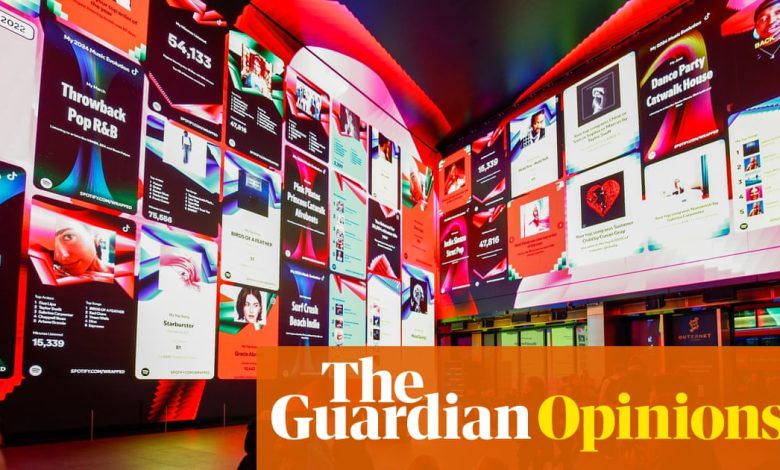It’s Spotify Wrapped season: a reminder of how incredibly dull streaming services have made us | Jochan Embley

i I asked the doctor when, if ever, I would feel better again. He shrugged good-naturedly and said he had no way of knowing. I left the office, put on my headphones and opened Spotify. Prompted as always to listen to an album I’d heard a thousand times before, I played the Cocteau Twins record that sounds like a warm bath. The album finished, and Spotify automatically switched to the band’s “radio,” an algorithmically generated spread of other Cocteau Twins tracks and bands that sound similar. Knowing made me feel a little less terrified.
It wasn’t always like that. When I worked in the culture desk of a newspaper, I spent hours every week eagerly searching for the best new music – going to gigs, scouring forums and looking at record label lists. Finding something exciting was like opening a portal to a new world. Spotify’s algorithmic model, a mysterious tangle of data that makes recommendations based on previously listened to songs, looks drab and synthetic by comparison. At least that was my arrogant argument. I was really afraid that the algorithms would make me obsolete.
As it happened, Covid got there first. I caught it in the summer of 2021 and was left with endless fatigue. Regular work became impossible, so I quit and moved in with my parents. Days of couch-bound nothingness mixed with impersonal fear; I still don’t fully know what causes the fatigue.
Discovering new music the way I used to felt impossible, partly because of my lack of energy, but mostly because it was too painful a reminder of the life that had left me. Listening to familiar music—prompted by Spotify’s suggestions—became the precious constant I craved. Before I knew it, I was hooked.
That’s what Spotify wants. We only see the surface, with albums or songs simply presented as ‘for you’, or playlists with slick, benign titles like ‘daily list’. But underneath swirl streams of collected data: preferred genres, times of day, devices used, even how long you listen before skipping. Everything comes together to offer one thing: music you’ll love.
The fact that Spotify has a 626 million– a strong user base suggests this approach works, bolstered by the frenzied social media response to Wrapped’s annual recap, in which users congratulate themselves on how many hundreds or thousands of hours they’ve listened to a single artist or genre.
But after a period of getting up to speed with the algorithms, I realized that by smoothing out my jagged anxieties, they had almost undermined my motivation to dig out new music. Really new music, I mean – the kind that re-ignites your synapses.
I wondered what Spotify thought of me. Indecisive? boring? How can the machine know I was listening that old D’Angelo song repeatedly, not just because of his honeyed tone (although obviously that was part of it), but because I needed an acquaintance to distract me from my inability to walk more than 10 minutes without feeling sick? Algorithms have an intimate understanding of how we listen but they have no idea why we do.
After three years my health is improving. Spotify’s model helped me when I needed it most, for which I am truly grateful, but now, as I try to recapture the joys stolen by fatigue, the algorithms stop me. The company’s marketing prides itself on the “discovery,” but it’s not the kind of thrilling misadventure I was embarking on. I’ve bought albums in the past just because I liked the look of the cover and they were often rubbish. Okay.
But there was the time, years ago, when I went on a whim to an experimental Japanese music night in east London, full of artists I’d never heard of, and my mind was diverted by a shape from a scene below that I never knew existed. I adored him. Spotify, instead, takes us on a conventional, calculated, boring meander. In the end, this is nothing more than a ploy to maximize customer engagement.
I’m sure I’m not the only one who has been seduced. Life has many ways to distract us from actively engaging with our passions, and algorithms are ready to speed things up. But if you don’t want to give up streaming, there are steps you can take.
Spotify actually has some excellent man-made playlists – look them up. And remember the world outside the app. Your local record store clerk will have his favorite album of the year – ask him about it. Music halls still host concerts – go and see someone you’ve never heard of. Radio still exists – listen.
I’ve tried all of these things over the past few months and after hearing the band from Oklahoma Chat stack on an indie radio show earlier this year, I was electrified by the noise-rock genre. It’s aggressive, unsettling, brilliant music – not something I used to think I liked, and certainly not something that would ever be stuffed into my Spotify.
You may already be doing all of these things to expand your horizons, and I understand that they may seem like embarrassingly obvious suggestions to an algorithm-obsessed moron. But to me they were quietly revolutionary.



